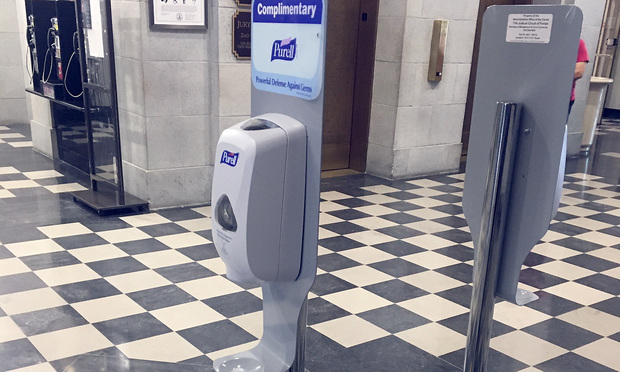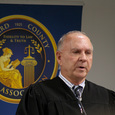'Watch and Prepare': Florida Courts Brace for Coronavirus
"With so many moving parts involved, attorneys, litigants, clerks of court, security and the Broward Sheriff's Office, this will take much planning, but we are committed to operate the courts, albeit on an emergency scale, should closure of the courts become a reality," said Broward Chief Judge Jack Tuter.
March 09, 2020 at 03:40 PM
5 minute read
 Hand sanitizer dispenser at Miami-Dade County Courthouse, 73 W. Flagler St., Miami. Courtesy photo.
Hand sanitizer dispenser at Miami-Dade County Courthouse, 73 W. Flagler St., Miami. Courtesy photo.
As fears about the spread of COVID-19 grip the world, a common theme has emerged in the response of South Florida state and federal courts: watching, planning, waiting—and sanitizing.
The Florida Supreme Court said it's following its pandemic plans after Gov. Ron DeSantis declared a public health emergency. Having wrapped up oral arguments for March, the court will consider any precautions for April's arguments in the coming weeks.
Spokesman Craig Waters encouraged use of the court's online broadcasts and electronic filing system, while discussions with governing authorities continue.
"During this emergency, we ask the public and the legal community to take advantage of digital access to the Florida Supreme Court," Waters said.
Miami-Dade Circuit has introduced hand sanitizer dispensers in all courthouse lobbies and says its emergency management team has been meeting with local partners and government officials to discuss preparation and response strategies.
The team is working with Miami-Dade County's Internal Services Department—responsible for maintenance of county-owned property—to arrange more frequent cleaning of shared workspaces and bathrooms, and "high-touch" surfaces like tables, doorknobs and collection containers at security checkpoints.
"All Eleventh Circuit continuity of operations plans, which are implemented any time there is a disruption to normal court operations, are being reviewed and appropriate steps are being taken to ensure these plans remain ready to implement immediately should the need arise," said Miami-Dade Circuit spokeswoman Eunice Sigler.
Sigler said the court is encouraging staff to follow official advice and has not yet made moves to encourage attendance by phone over in person.
"These procedures, among others, will be reviewed and adapted as needed based on any new developments and recommendations issued by health authorities regarding the coronavirus," Sigler said.
Read what courts across the U.S. are doing: As Coronavirus Spreads, Legal Industry Shifts into Crisis Management Mode
Uncertainty about inmates
Broward Circuit Chief Judge Jack Tuter said his court is also following the Centers for Disease Control and Prevention's guidance and has met several times to discuss the virus, most recently sitting down with stakeholders Friday. The Office of State Courts Administrator is taking the lead.
 Broward Circuit Chief Judge Jack Tuter. Photo: J. Albert Diaz/ALM.
Broward Circuit Chief Judge Jack Tuter. Photo: J. Albert Diaz/ALM.Tuter said the court is considering conducting some proceedings via video or telephone conferences, prioritizing first appearances, domestic violence and some criminal court hearings. The court might also use teleconferencing for civil and family cases.
"What we do not know is how the jail may be affected by the virus," Tuter said. "If no inmate movement is permitted or limited movement based on a quarantine plan, it will be difficult to implement a plan. Since we just began discussions in the past few days, we have much work ahead."
Broward courthouses will soon feature more hand santizer dispensers, according to Tuter, who said maintenance staff will sanitize frequently used areas like escalators and elevators, and court personnel might be asked to wipe down door handles.
"I anticipate more steps on this in the near future. Because of the uncertainty of how this virus may impact large public buildings such as our courthouses, we are working on preliminary plans to resume court functions if the courthouses are closed for any extended period of time," Tuter said. "With so many moving parts involved, attorneys, litigants, clerks of court, security and the Broward Sheriff's Office, this will take much planning, but we are committed to operate the courts, albeit on an emergency scale, should closure of the courts become a reality."
Waiting game
It's a similar story at Palm Beach Circuit Court, where spokeswoman Debra Oats said staff are following guidelines, meeting with local partners to draft plans in case of disruption and staying in contact with the state supreme court's emergency team.
"The plan for court events will depend on the status/presence of COVID-19 in the county and if and how it affects the public, the court staff and court partners," Oats said.
Oats said the court has also bought cleaning products, gels and masks, and is keeping employees updated on prevention strategies.
The court administrator's office for the Southern District of Florida said it's weighing its options, including restricting access of jurors and visitors at higher risk of catching the virus, and is in talks with the U.S. Marshals Service about moving at-risk prisoners or having them appear via VideoLink if necessary.
The Florida Bar said it's "closely monitoring" what's happening at the Florida Supreme Court, the Office of the State Courts Administrator and the Florida Court Public Information Officers, while leaders and staff are watching for travel restrictions or advisories, in case that affects meetings.
The bar said it's "prepared to assist in communicating court-related information to attorneys and the public," and has published an article in which Chief Justice Charles Canady urged the public to "watch and prepare."
Read more:
Can Coronavirus Victims Sue for Injuries?
Infection Spreads to Relatives, Neighbor of NY Attorney Who Visited Miami
This content has been archived. It is available through our partners, LexisNexis® and Bloomberg Law.
To view this content, please continue to their sites.
Not a Lexis Subscriber?
Subscribe Now
Not a Bloomberg Law Subscriber?
Subscribe Now
NOT FOR REPRINT
© 2025 ALM Global, LLC, All Rights Reserved. Request academic re-use from www.copyright.com. All other uses, submit a request to [email protected]. For more information visit Asset & Logo Licensing.
You Might Like
View All
Plaintiffs Attorneys Awarded $113K on $1 Judgment in Noise Ordinance Dispute
4 minute read
US Judge Cannon Blocks DOJ From Releasing Final Report in Trump Documents Probe
3 minute read

Read the Document: DOJ Releases Ex-Special Counsel's Report Explaining Trump Prosecutions
3 minute readTrending Stories
- 1Uber Files RICO Suit Against Plaintiff-Side Firms Alleging Fraudulent Injury Claims
- 2The Law Firm Disrupted: Scrutinizing the Elephant More Than the Mouse
- 3Inherent Diminished Value Damages Unavailable to 3rd-Party Claimants, Court Says
- 4Pa. Defense Firm Sued by Client Over Ex-Eagles Player's $43.5M Med Mal Win
- 5Losses Mount at Morris Manning, but Departing Ex-Chair Stays Bullish About His Old Firm's Future
Who Got The Work
J. Brugh Lower of Gibbons has entered an appearance for industrial equipment supplier Devco Corporation in a pending trademark infringement lawsuit. The suit, accusing the defendant of selling knock-off Graco products, was filed Dec. 18 in New Jersey District Court by Rivkin Radler on behalf of Graco Inc. and Graco Minnesota. The case, assigned to U.S. District Judge Zahid N. Quraishi, is 3:24-cv-11294, Graco Inc. et al v. Devco Corporation.
Who Got The Work
Rebecca Maller-Stein and Kent A. Yalowitz of Arnold & Porter Kaye Scholer have entered their appearances for Hanaco Venture Capital and its executives, Lior Prosor and David Frankel, in a pending securities lawsuit. The action, filed on Dec. 24 in New York Southern District Court by Zell, Aron & Co. on behalf of Goldeneye Advisors, accuses the defendants of negligently and fraudulently managing the plaintiff's $1 million investment. The case, assigned to U.S. District Judge Vernon S. Broderick, is 1:24-cv-09918, Goldeneye Advisors, LLC v. Hanaco Venture Capital, Ltd. et al.
Who Got The Work
Attorneys from A&O Shearman has stepped in as defense counsel for Toronto-Dominion Bank and other defendants in a pending securities class action. The suit, filed Dec. 11 in New York Southern District Court by Bleichmar Fonti & Auld, accuses the defendants of concealing the bank's 'pervasive' deficiencies in regards to its compliance with the Bank Secrecy Act and the quality of its anti-money laundering controls. The case, assigned to U.S. District Judge Arun Subramanian, is 1:24-cv-09445, Gonzalez v. The Toronto-Dominion Bank et al.
Who Got The Work
Crown Castle International, a Pennsylvania company providing shared communications infrastructure, has turned to Luke D. Wolf of Gordon Rees Scully Mansukhani to fend off a pending breach-of-contract lawsuit. The court action, filed Nov. 25 in Michigan Eastern District Court by Hooper Hathaway PC on behalf of The Town Residences LLC, accuses Crown Castle of failing to transfer approximately $30,000 in utility payments from T-Mobile in breach of a roof-top lease and assignment agreement. The case, assigned to U.S. District Judge Susan K. Declercq, is 2:24-cv-13131, The Town Residences LLC v. T-Mobile US, Inc. et al.
Who Got The Work
Wilfred P. Coronato and Daniel M. Schwartz of McCarter & English have stepped in as defense counsel to Electrolux Home Products Inc. in a pending product liability lawsuit. The court action, filed Nov. 26 in New York Eastern District Court by Poulos Lopiccolo PC and Nagel Rice LLP on behalf of David Stern, alleges that the defendant's refrigerators’ drawers and shelving repeatedly break and fall apart within months after purchase. The case, assigned to U.S. District Judge Joan M. Azrack, is 2:24-cv-08204, Stern v. Electrolux Home Products, Inc.
Featured Firms
Law Offices of Gary Martin Hays & Associates, P.C.
(470) 294-1674
Law Offices of Mark E. Salomone
(857) 444-6468
Smith & Hassler
(713) 739-1250






